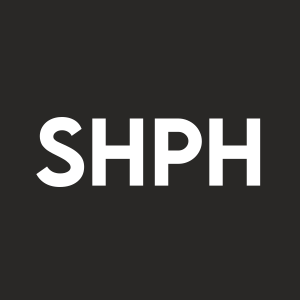Shuttle Pharma FDA Orphan-Drug Nears Patient Enrollment Milestone for Phase 2 Clinical Trial
Rhea-AI Summary
Positive
- Nearly 50% enrollment achieved in Phase 2 trial with favorable initial safety profile
- Drug well-tolerated with toxicity no greater than 2 on a 1-5 scale
- 84% of enrolled patients completed all seven treatment cycles
- FDA Orphan Drug Designation secured, providing potential marketing exclusivity
- Large market opportunity with 400,000 potential patients, expected to grow 22% in 5 years
Negative
- Final data readout not expected until 2026
- Additional patient enrollment still needed to reach statistical significance
- No guarantee of FDA approval or successful trial completion
News Market Reaction – SHPH
On the day this news was published, SHPH declined 13.89%, reflecting a significant negative market reaction.
Data tracked by StockTitan Argus on the day of publication.
GAITHERSBURG, Md., May 08, 2025 (GLOBE NEWSWIRE) -- Shuttle Pharmaceuticals Holdings, Inc. (Nasdaq: SHPH) (“Shuttle Pharma” or the “Company”), a discovery and development stage specialty pharmaceutical company focused on improving outcomes for cancer patients treated with radiation therapy (RT), announced today that it has nearly achieved
“We are incredibly encouraged by the expedited progress of our Phase 2 trial and the dedication of our team, clinical partners, and patients who are making this milestone possible,” commented Shuttle Pharma's Chairman and Chief Scientific Officer, Anatoly Dritschilo, M.D. “If approved, we believe that Ropidoxuridine has the potential to redefine the standard approach for how to care for patients with glioblastoma.”
Ropidoxuridine (IPdR) is Shuttle Pharma's lead candidate radiation sensitizer for use in combination with RT to treat brain tumors (glioblastoma), a deadly malignancy of the brain with no known cure. Shuttle Pharma previously received Orphan Drug Designation from the FDA, providing Shuttle Pharma with potential marketing exclusivity upon obtaining FDA approval for treatment of this disease.
The Phase 2 clinical trial design initially randomizes 40 patients into two different dose levels of drug, with 20 patients receiving 1,200 mg/day and 20 patients receiving 960 mg/day, to determine an optimal dose for use in glioblastoma patients in combination with RT. After the optimal dose is identified, 14 additional patients will be enrolled at the optimal dose to reach statistical significance with the end-point demonstrating increased survival as compared to historical controls.
The Phase 2 clinical trial is conducted at Georgetown University Medical Center, Allegheny Health Network (AHN) Cancer Institute, UNC Medical Center, the UVA Cancer Center, John Theurer Cancer Center at Hackensack University Medical Center, and Miami Cancer Institute, part of Baptist Health South Florida.
“This clinical trial is critical to the broader radiation therapy industry as we look to leverage radiation sensitizers to increase cancer cure rates, prolong patient survival and improve quality of life for patients suffering from glioblastoma. I look forward to continued trial execution as we aim to improve the lives of millions of patients impacted by cancer and to bring hope to patients and families around the world,” Dr. Dritschilo concluded.
An estimated 800,000 patients in the US are treated with radiation therapy for their cancers yearly. According to the American Cancer Society and the American Society of Radiation Oncologists, about
More information about the Phase 2 study (NCT06359379) can be found at www.clinicaltrials.gov.
About Shuttle Pharmaceuticals
Founded in 2012 by faculty members of the Georgetown University Medical Center, Shuttle Pharma is a discovery and development stage specialty pharmaceutical company focused on improving the outcomes for cancer patients treated with radiation therapy (RT). Our mission is to improve the lives of cancer patients by developing therapies that are designed to maximize the effectiveness of RT while limiting the side effects of radiation in cancer treatment. Although RT is a proven modality for treating cancers, by developing radiation sensitizers, we aim to increase cancer cure rates, prolong patient survival and improve quality of life when used as a primary treatment or in combination with surgery, chemotherapy and immunotherapy. For more information, please visit our website at www.shuttlepharma.com.
Safe Harbor Statement
Statements in this press release about future expectations, plans and prospects, as well as any other statements regarding matters that are not historical facts, may constitute “forward-looking statements.” These statements include, but are not limited to, statements concerning the development of our company. The words “anticipate,” “believe,” “continue,” “could,” “estimate,” “expect,” “intend,” “may,” “plan,” “potential,” “predict,” “project,” “should,” “target,” “will,” “would” and similar expressions are intended to identify forward-looking statements, although not all forward-looking statements contain these identifying words. Actual results may differ materially from those indicated by such forward-looking statements as a result of various important factors, including factors discussed in the “Risk Factors” section of Shuttle Pharma’s Annual Report on Form 10-K for the year ended December 31, 2024, filed with the SEC on February 26, 2025, as well other SEC filings. Any forward-looking statements contained in this press release speak only as of the date hereof and, except as required by federal securities laws, Shuttle Pharmaceuticals specifically disclaims any obligation to update any forward-looking statement, whether as a result of new information, future events or otherwise.
Shuttle Pharmaceuticals
Anatoly Dritschilo, M.D.
Chairman and Chief Scientific Officer
240-403-4212
info@shuttlepharma.com
Investor Contacts
Lytham Partners, LLC
Robert Blum
602-889-9700
shph@lythampartners.com







